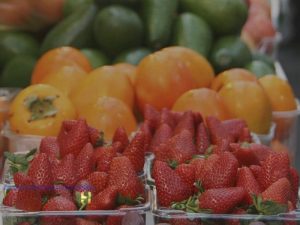If you are familiar with the classic food pyramid, you will know that dairy is one of the main food groups. That’s because it provides numerous health benefits and is essential for childhood growth.
So what makes a product dairy? Any fluid milk product (produced by the mammary gland in a mammal), or foods made from milk that retain calcium, fall under the dairy category. A common error is thinking that eggs are a dairy product. Even though eggs are usually sold alongside dairy products and come from an animal, they do not come from the mammary gland and therefore do not fit the bill. There are some exceptions that are part of the dairy family, such as calcium-fortified soy milk.
What makes dairy so essential? Dairy has been shown to prevent some chronic diseases and help overall health. Products made from dairy carry key nutrients such as vitamin A, vitamin D, riboflavin, vitamin B12, protein, potassium, zinc, choline, magnesium, phosphorus and calcium.
The Healthy US-Style Pattern guide recommends the consumption of dairy be based on age as opposed to calorie level. The equivalent of two cups a day are recommended for children aged two to three, two-and-a-half cups for ages four to eight and three cups for ages nine to 18, as well as adults.
Dairy can be critical to overall health, but not all bodies respond well to dairy products. Lactose intolerance is a condition that causes adverse symptoms to products made from milk. If you think you may have lactose intolerance, talk to your healthcare professional. Calcium and other nutrients found in dairy products are important to overall wellness, so if you are lactose intolerant it is important to find product substitutes. Not all dairy products are equally healthy, so read up on the healthiest way to meet your dairy requirements. If you are a parent, look for creative ways to add dairy to your child’s meals.
Health Benefits of Dairy
The combined nutrients in dairy have been found to be vital to childhood development, as well as being preventative for illnesses. Studies found dairy products to have the following benefits:
- The intake of dairy products can help facilitate weight loss.
- A high dairy diet reduces the risk of childhood obesity, as well as improving body composition in adults.
- A diet with high dairy intake lowers the risk of developing type 2 diabetes.
- There is a high probability that dairy products protect against colorectal cancer, bladder cancer and gastric cancer.
If you break down the separate nutrients in dairy there are benefits, such as:
- Calcium: Builds and maintains bone mass and
- Potassium: Maintains healthy blood pressure.
- Vitamin D: Helps build and maintain
Dairy products
The following are the most common dairy products:
- Milk.
- Cheese.
- Yogurt.
- Soy milk.
- Butter.
- Non-fat dry milk.
- Ice cream.
Some ingredients listed in surprising grocery items, such as salad dressing, are in the dairy family. If you are trying to avoid dairy read all product labels and keep your eyes open for the following:
Low-fat Dairy Products
Also listed in the Healthy US–Style Pattern guide is the recommendation for low-fat dairy products. The report recommends choosing products listed as low-fat, fat-free or 1 per cent over 2 per cent, whole milk and regular cheese. These options will provide the same nutrients as their regular counterparts but with less fat. The guide also recommends choosing milk and yogurt over cheese, as they contain less saturated fat and sodium.
Lactose Intolerance
An estimated 30 to 50 per cent of Americans suffer from some degree of lactose intolerance. This condition– where the body is unable to digest lactose, a sugar found in milk and milk products – is not life threatening but can cause nausea, cramps and diarrhea. The cause of this intolerance is largely unknown, but if you have a digestive disease such as ulcerative colitis, Crohn’s disease or any other inflammatory bowel disease you could be at a higher risk. Certain populations and races have a higher likelihood of being lactose intolerant such as Latin Americans, African-Americans, Native Americans, East Europeans and Middle Easterners. There are medications available to prevent the symptoms associated with lactose intolerance, as well as lactose-free products, so talk to your doctor.
Dairy-free Products
Dairy-free and lactose-free products are now a staple on grocery shelves, providing options for the lactose-intolerant and vegan communities. For those who wish to transform their diet, you now don’t have to give up your favorite foods. The following products are available in dairy-free, tofu and lactose-free options:
- Milk: There is almond milk, lactose-free milk, coconut milk, so take your pick.
- Cheese: Vegan Several companies produce tofu cheese.
- Ice cream: One of the hardest guilty pleasures to give up but now you can find lactose-free and coconut milk ice creams in your favorite flavors.
- Cream cheese: A vegan creation courtesy of tofu.
- Yogurt: Available in many
- Dressing: Dressing is often made with dairy byproducts, so read labels to find completely dairy-free
Non-dairy Products
Calcium is an essential nutrient in your diet, but for those who cannot or do not wish to consume dairy there are alternatives. The following are calcium-rich products that do not contain dairy:
- Calcium-fortified juices.
- Cereals.
- Breads.
- Rice milk.
- Almond milk.
- Salmon.
- Soybeans.
- Soy products (tofu, soya, yogurt etc).
- Leafy greens (kale, collard greens, bok choy etc).
Get your Daily Dairy
Adding dairy or dairy substitutes to your daily meals doesn’t have to be a chore. Here are a few tips to ensure you get your daily dose of dairy, but in the healthiest way:
- Use fat-free milk in your cereal.
- Make smoothies using fat-free
- Add cheese to eggs and omelets.
- Snack on fat-free
- Add low-fat cheese to salads and
- Make quesadillas with low-fat cheese and serve with low-fat yogurt instead of sour cream.











